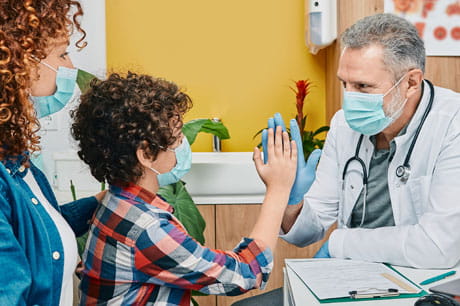How to avoid getting sick during travel or vacation
,
Nothing can take the fun out of vacation quite like getting sick
While fun and exciting, travel can be stressful on our bodies. And this stress can weaken our immune systems, making us more susceptible to illnesses. Whether it’s a cold, the flu, or tummy troubles, you’re going to remember your vacation for all the wrong reasons if you get sick.
“Although you can’t always avoid getting sick, there are some things you can do before, during and after your travel or vacation to help you stay healthy,” says Dr. Christian Shuman, family medicine physician at Geisinger Pottsville.
Here are our tips for staying healthy throughout your travels.
“Getting enough sleep on a regular basis is a key component in boosting your immune system,” says Dr. Shuman. Research has shown that lack of sleep can increase your risk of catching a cold or flu, so make sure you’re getting somewhere between seven to nine hours of sleep each night.
Stress has also been shown to lower your immune system’s ability to keep you healthy. Even though you may be worried about a ton of things at work and about your travel plans, find moments to take a deep breath and relax.
And remember to give yourself a day or two after you get home to rest and recover, especially if you’ve done a lot of traveling.
“Depending on where you’re traveling, you may need vaccinations, especially if you’re going to certain parts of developing countries,” notes Dr. Shuman. “Your doctor will be able to tell you which vaccines you may need as well as provide you with education and prescriptions for illnesses like malaria and traveler’s diarrhea.”
If you’re on prescription medications or are managing a chronic health condition such as diabetes, a visit to your doctor will ensure you don’t run out of your medications, and you’ll know how to take care of yourself away from home.
“There’s an incredible amount of germs for you to pick up in an airport, plane and any other form of public transportation,” says Dr. Shuman. “Bringing hand sanitizer will help you keep your hands clean even if you don’t have access to soap and water.”
You’ll be happy you brought along a bottle of sanitizer and disinfectant wipes when you arrive in your vacation destination, too – you’ll be able to ward off germs no matter what activity you’re doing or site you’re seeing.
And, just as you would at home, try to avoid coming in contact with someone who’s sick. If you hear someone coughing and sneezing or see someone who looks like they’re sick, try to keep your distance.
“If you’re planning to spend time outside, make sure you have sunscreen and insect repellent with you,” says Dr. Shuman. “You’ll need both to protect yourself from sunburns, pesky bug bites and potential mosquito-borne illnesses.”
In addition to any prescriptions you’re taking, you should also consider packing antihistamines, Pepto-Bismol or another antidiarrheal medication, decongestants, medicine for pain or fever, antacids, and cough suppressants or expectorants.
“Although you may not want to plan on someone getting sick during vacation, bringing everything you may need in case it happens can help you or your travel companion feel better quicker and get back to the vacation fun,” says Dr. Shuman.
“Even getting slightly dehydrated can mean headaches, dizziness, lightheadedness, muscle weakness and fatigue,” says Dr. Shuman.
Dehydration can occur much quicker in high temperatures, too.
“If you’re in a hot climate, make sure to drink plenty of fluids to stay hydrated,” says Dr. Shuman. “This allows your body to sweat and maintain a normal temperature, preventing a heat-related illness.”
Hopping a flight to your destination? Staying hydrated is important here, too.
“There’s a significant lack of humidity in planes’ cabin air – it typically has a humidity of 10 to 20 percent whereas typical indoor humidity is 30 to 65 percent,” explains Dr. Shuman. “The lack of humidity makes it easy for you to get dehydrated during your flight.”
Staying hydrated doesn’t just mean drinking plenty of water – it also means limiting beverages that can dehydrate you, including caffeinated beverages and alcohol.
“Frequently washing your hands means you’ll be less likely to transfer germs into your system that can make you sick,” says Dr. Shuman.
Bonus tip: Slow down, relax, laugh and have fun. You’re on vacation, after all!
Find a primary care physician
Learn more about primary care at Geisinger
“Although you can’t always avoid getting sick, there are some things you can do before, during and after your travel or vacation to help you stay healthy,” says Dr. Christian Shuman, family medicine physician at Geisinger Pottsville.
Here are our tips for staying healthy throughout your travels.
Rest up and de-stress
You may be planning to rest and relax on your vacation, but rest before your trip can help keep you healthy.“Getting enough sleep on a regular basis is a key component in boosting your immune system,” says Dr. Shuman. Research has shown that lack of sleep can increase your risk of catching a cold or flu, so make sure you’re getting somewhere between seven to nine hours of sleep each night.
Stress has also been shown to lower your immune system’s ability to keep you healthy. Even though you may be worried about a ton of things at work and about your travel plans, find moments to take a deep breath and relax.
And remember to give yourself a day or two after you get home to rest and recover, especially if you’ve done a lot of traveling.
Visit your doctor
If you’re planning to travel internationally, you should make an appointment to see your primary care physician.“Depending on where you’re traveling, you may need vaccinations, especially if you’re going to certain parts of developing countries,” notes Dr. Shuman. “Your doctor will be able to tell you which vaccines you may need as well as provide you with education and prescriptions for illnesses like malaria and traveler’s diarrhea.”
If you’re on prescription medications or are managing a chronic health condition such as diabetes, a visit to your doctor will ensure you don’t run out of your medications, and you’ll know how to take care of yourself away from home.
Prepare to fight germs
If you’re flying to your vacation destination, make sure you pack a TSA-friendly bottle of hand sanitizer and disinfectant wipes in your carry-on bag.“There’s an incredible amount of germs for you to pick up in an airport, plane and any other form of public transportation,” says Dr. Shuman. “Bringing hand sanitizer will help you keep your hands clean even if you don’t have access to soap and water.”
You’ll be happy you brought along a bottle of sanitizer and disinfectant wipes when you arrive in your vacation destination, too – you’ll be able to ward off germs no matter what activity you’re doing or site you’re seeing.
And, just as you would at home, try to avoid coming in contact with someone who’s sick. If you hear someone coughing and sneezing or see someone who looks like they’re sick, try to keep your distance.
Pack to protect your health
You may be thinking about outfits, accessories and electronics, but don’t forget all the things you’ll need to protect your health while you’re away.“If you’re planning to spend time outside, make sure you have sunscreen and insect repellent with you,” says Dr. Shuman. “You’ll need both to protect yourself from sunburns, pesky bug bites and potential mosquito-borne illnesses.”
In addition to any prescriptions you’re taking, you should also consider packing antihistamines, Pepto-Bismol or another antidiarrheal medication, decongestants, medicine for pain or fever, antacids, and cough suppressants or expectorants.
“Although you may not want to plan on someone getting sick during vacation, bringing everything you may need in case it happens can help you or your travel companion feel better quicker and get back to the vacation fun,” says Dr. Shuman.
Drink plenty of water
The average person needs to drink two liters of water per day to stay hydrated, and that’s if they’re not doing any major physical activity and are in an average temperature environment. Drinking plenty of water to stay hydrated is important, especially on vacation.“Even getting slightly dehydrated can mean headaches, dizziness, lightheadedness, muscle weakness and fatigue,” says Dr. Shuman.
Dehydration can occur much quicker in high temperatures, too.
“If you’re in a hot climate, make sure to drink plenty of fluids to stay hydrated,” says Dr. Shuman. “This allows your body to sweat and maintain a normal temperature, preventing a heat-related illness.”
Hopping a flight to your destination? Staying hydrated is important here, too.
“There’s a significant lack of humidity in planes’ cabin air – it typically has a humidity of 10 to 20 percent whereas typical indoor humidity is 30 to 65 percent,” explains Dr. Shuman. “The lack of humidity makes it easy for you to get dehydrated during your flight.”
Staying hydrated doesn’t just mean drinking plenty of water – it also means limiting beverages that can dehydrate you, including caffeinated beverages and alcohol.
Frequently wash your hands
Just like at home, regularly washing your hands is key in avoiding getting sick.“Frequently washing your hands means you’ll be less likely to transfer germs into your system that can make you sick,” says Dr. Shuman.
Bonus tip: Slow down, relax, laugh and have fun. You’re on vacation, after all!
Next steps:
Schedule an appointment with Christian Shuman, MDFind a primary care physician
Learn more about primary care at Geisinger


Content from General Links with modal content



